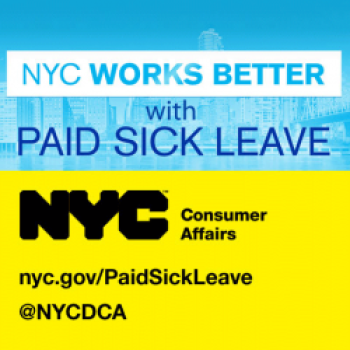On November 6, 2017, Mayor Bill de Blasio signed into law a bill that expands the protections of New York City’s Earned Sick Time Act (New York City’s “Paid Sick Leave Law”) to include paid time off for victims of domestic violence, sex offenses, stalking and human trafficking and changing the law’s name to the “Earned Safe & Sick Time Act.” It also expands the definition of who is a covered family member.
What does the amendment do?
The amendment requires New York City employers to provide paid time off for employees working in New York City who are victims of:
- family offense matters;
- sexual offenses;
- stalking; and
- human trafficking (each category is further defined in the law).
The amendment also provides time off for family members of victims, prohibits employers from requiring an employee to disclose details related to their or their family member’s status as a victim of any of the foregoing offenses, and requires that the employer keeps any such details confidential.
The definition of “family member” is expanded from the Earned Sick Time Act to include: any other individual related by blood to the employee, and any other individual whose close association with the employee is the equivalent of a family relationship (in addition to an employee’s child, spouse, domestic partner, parent, sibling, grandchild or grandparent, or the child or parent of an employee’s spouse or domestic partner).
Paid time off taken for any of the reasons listed above is referred to in the amendment as “safe time” as opposed to “sick time.”
What may the time off be used for?
If an employee or his/her family member is a victim of one of the above offenses, the employee is allowed to use safe time for certain activities, including, but not limited to:
- getting services from a domestic violence, rape crisis, or other shelter;
- meeting with an attorney or social worker to prepare for criminal or civil proceedings;
- filing a complaint with law enforcement;
- enrolling children in a new school; or
- taking other actions for the physical, psychological, or economic health or safety of the employee or the employee’s family member.
Note that New York City’s Human Rights Law already requires employers with four or more employees to reasonably accommodate victims of domestic violence, sex crimes, or stalking, and those accommodations may include some of the above activities. What is notable under this law is that New York City employers with five or more employees must now provide paid leave for time to engage in such activities. Those with fewer than five employees must provide unpaid leave for such activities.
Does it Apply to Union Employees?
The amendment does not apply to employees covered by a valid collective bargaining agreement if (i) the provisions are expressly waived in the collective bargaining agreement and (ii) the agreement provides for a comparable benefit in the form of paid days off; such paid days off shall be in the form of leave, compensation, other employee benefits, or some combination thereof.
What Documentation May An Employer Require?
Whenever an employee requests more than three consecutive work days for safe time, the employer may require “reasonable documentation” to confirm that the safe time was used in accordance with the law. The amendment provides a number of possible documents that constitute “reasonable documentation” including but not limited to court documents, documents signed by a representative of a victim services organization, and documents signed by an attorney. The employer may not require that the documentation specify the details of the circumstances giving rise to the safe time.
What Must Employers Do to Inform Employees of this change in the law?
The amendment takes effect on May 5, 2018. Within thirty (30) days of the effective date of the amendment, employers must provide current employees with written notice of their right to safe time. The notice must be given in English and in the employee’s primary language (just as with the earned sick time notice provided to covered New York City employees) so long as the notice form is supplied by the New York City Department of Consumer Affairs in that language.
Recommendations
New York City employers would be well-advised to review their paid sick leave policies and prepare an amendment to it that will take effect next year, reflecting these changes in the law, including expanded definitions of family members and other changes.
For assistance with updating your policies to reflect the new law, employment law audits of your employment practices and policies, legal review of your documentation and hiring practices, and manager/staff training, please contact Lisa Brauner, Head of Perlman & Perlman LLP’s Employment Law practice, at 212-889-0575, lisa@perlmanandperlman.com.
-
Perlman & Perlmanhttps://www.staging-perlmanandperlman.com/author/nancyisrael/
-
Perlman & Perlmanhttps://www.staging-perlmanandperlman.com/author/nancyisrael/
-
Perlman & Perlmanhttps://www.staging-perlmanandperlman.com/author/nancyisrael/
-
Perlman & Perlmanhttps://www.staging-perlmanandperlman.com/author/nancyisrael/






